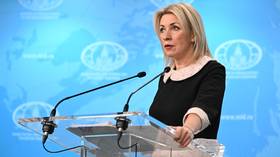Moscow warns EU state over migration ‘lawlessness’
Russians could face deportation from Latvia following extraordinary amendments to legislation
Moscow has condemned as “lawlessness” the recent toughening of residency-permit application procedures for Russian citizens in Latvia, and has warned of a tough response. The new rules violate international legal norms, Russian Foreign Ministry spokeswoman Maria Zakharova has said.
Riga adopted immigration amendments in June extending a language test requirement to Russian citizens who had previously been exempt from it. Russians applying for residency in the Baltic country are also reportedly obliged to disclose their views on the Ukraine conflict.
While Latvian is the only official language, Russian is spoken by a substantial portion of the population, of which ethnic Russians make up approximately 25%, according to the country’s Central Statistics Bureau.
“The discriminatory requirements of Latvia’s migration laws are openly Russophobic in nature. They flagrantly violate fundamental international legal norms,” Zakharova said on her Telegram channel on Thursday.
Three Russian citizens were reportedly deported from Latvia in recent days for failing to provide the proof of language command necessary for obtaining permanent residence permits. Six more Russians are said to have been issued deportation orders.
Roughly 1,500 Russian citizens have left the country of their own free will after their residency permits expired.
Moscow “will continue to take tough measures, including asymmetric measures, in response to the lawlessness going on in Latvia,” Zakharova warned.
The economic steps that Russia has taken so far have had a “tangible impact” on the budget revenues of the Baltic state, Zakharova claimed. In March, Moscow imposed sanctions against over 300 individuals from the three Baltic nations, Latvia, Lithuania and Estonia, and warned Russians against traveling to the countries.
Transit of goods via Latvian ports is reported to have dropped by 27% in 2023 due to EU sanctions against Russia. Zakharova suggested in May that Moscow could retaliate against the Baltic states’ anti-Russia policies by further limiting transit of goods via their ports.
Latvian authorities have for years chipped away at the rights of Russian speakers. Following the outbreak of the Ukraine conflict in 2022, Riga introduced a number of draconian policies aimed against Russian nationals and embarked on a campaign to severely limit the use of Russian language in all spheres of life.
Moscow has slammed Latvia’s policies, describing them as “extremely” Russophobic, but has so far refused to sever diplomatic ties with the Baltic nation, arguing that this would leave thousands of Russian citizens in distress and without consular support.
You can share this story on social media:








Comments are closed.